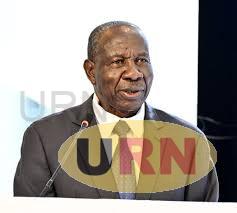Finance Minister Matia Kasaija has credited President Museveni’s leadership for steering Uganda into a resilient and competitive economy, citing major strides made during the first half of Uganda Vision 2040. “Let me first congratulate His Excellency the President on his leadership that has built a resilient, stable, transformative and competitive economy that is attractive to investors,” Kasaija said, as he delivered the national budget speech for the 2025/26 financial year.
He noted that Uganda is among the fastest growing economies in the world, projected to become the fastest growing by 2031, according to the Harvard Growth Lab. The minister attributed this growth to a unique ideological framework. “The growth is on account of a unique economic ideology championed by His Excellency the President, which is built on the four principles of socio-economic transformation, patriotism, Pan-Africanism and democracy.”

He outlined Uganda’s journey from conflict and poverty to stability and growth. “The initial years of the NRM Government before 2010 were dedicated to restoring sustainable peace, recovering and stabilising a broken economy, addressing extreme poverty and implementing reforms that liberalised the economy,” Kasaija said. “We are now in the phase of socio-economic transformation to facilitate wealth creation and prosperity.”
The upcoming budget concludes the current NRM Manifesto and kickstarts implementation of the Fourth National Development Plan (NDPIV). Over the next 15 years, government will implement the Tenfold Economic Growth Strategy, aimed at expanding Uganda’s economy from USD 61.3 billion in FY 2024/25 to USD 500 billion by 2040.
“Madam Speaker, over the accountability period, Government has undertaken targeted investments that have built a firm foundation and strengthened the resilience of our economy,” he said, before listing a series of key achievements.
The economy has more than tripled, from Shs 64.8 trillion (USD 27.9 billion) in FY 2010/11 to Shs 226.3 trillion (USD 61.3 billion) in FY 2024/25. In March 2024, Uganda met the criteria for graduation from Least Developed Country (LDC) status. Life expectancy improved from 50.4 years in 2002 to 68.2 years in 2023/24.
The population living within five kilometres of a health facility is now 91 percent, up from about 80 percent in FY 2010/11. In education, 81 percent of parishes now have government-aided schools. Poverty has reduced to 16.1 percent in FY 2023/24 from 24.5 percent in FY 2010/11. Meanwhile, the proportion of persons in the subsistence economy dropped from 69 percent in FY 2010/11 to 33 percent.
“Uganda is becoming a more equal society,” the minister said, citing the Uganda Bureau of Statistics’ latest household survey. “The Gini coefficient… has reduced to 38 percent from 41 percent in 2020.”
He added that Ugandans can now travel to all borders and regions by tarmac or improved murram roads. Electricity generation capacity increased from 595 megawatts in FY 2010/11 to 2,051 megawatts in FY 2023/24, and access to electricity rose from 11 percent to 57 percent over the same period.
Internet subscription rose to 53 percent in 2022, up from 1.8 percent in 2010, with the national ICT backbone extended to 4,300 kilometres by FY 2022/23. On economic diversification, Kasaija said Uganda has added 31 new products to its export basket over the past 15 years, including steel, processed food, cement, pharmaceuticals, dairy products, ceramics and cloth.
He also reported that the number of manufacturing units increased from 31,757 in 2010/11 to 50,000 in 2023/24. “Uganda’s economy has been able to achieve all these milestones on account of the right strategy of the NRM Government.”
Looking ahead, Kasaija said the country is now ready for faster transformation. “Since the necessary foundation has already been established… the speed of economic transformation is destined to be faster in the medium term.” He concluded, “The budget for next financial year, and over the medium term, is focused on people and wealth creation.” The theme for the 2025/26 budget remains: Full Monetisation of Uganda’s Economy through Commercial Agriculture, Industrialisation, Expanding and Broadening Services, Digital Transformation and Market Access.
